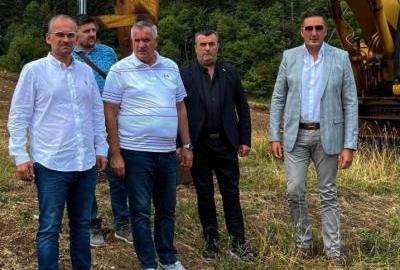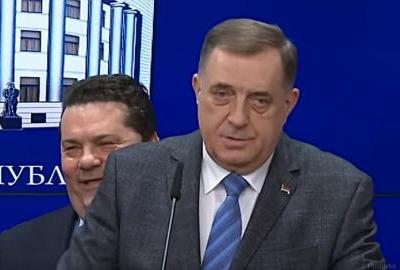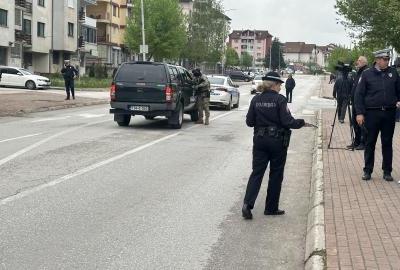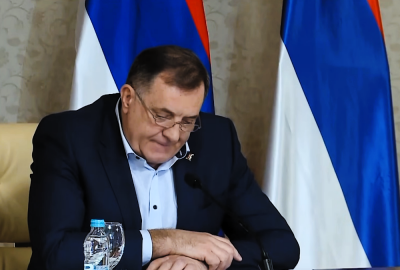Žurnal in English
ADVENTURE CALLED TRANSFER OF COMPETENCES: Investor withdrawal and collection of billions of loans will follow!
What happened in the National Assembly of Republika Srpska and what could be heard from Milorad Dodik and the accompanying group can be interpreted as "peaceful and dignified demolition of Bosnia and Herzegovina". Of course, everything is far more serious than making jokes. The biggest problem is that the population that supports them does not receive meaningful warnings about the logical consequences that this, for now only a political adventure, brings in the eventual practice.

The announcements and threats of the member of the Presidency of BiH and the leader of the SNSD, Milorad Dodik, regarding the unilateral return of competencies from the state to the entity, ie return to the "original Dayton", are slowly beginning to materialize. He and his SNSD and coalition partners have started the practical collapse of BiH institutions. Despite numerous threats and warnings, the ruling elites in RS do not seem to be giving up on the unilateral transfer of competencies. Experts and the opposition agree - this is a game with the lives of citizens. Despite all this, there is still no concrete response from the international community, the OHR and judicial institutions in BiH.
After recently adopting the Law on Medicines and Medical Devices of Republika Srpska, the RS National Assembly adopted a set of conclusions on the transfer of competencies in the field of indirect taxation, judicial institutions, defence and security, and the Declaration on Constitutional Changes were adopted.
Although, de facto, the adopted conclusions do not have direct legal effects, this does not mean that they are insignificant. On the contrary, they are another in a series of attacks on the state and its institutions, led by Milorad Dodik and his SNSD. Dodik's adoption of the conclusions in the NARS was needed as proof that he is not alone in this adventure, that the institutions of Republika Srpska and political associates are behind him, who are obviously ready to take the risk of criminal responsibility and other sanctions announced by the USA, Great Britain and many EU countries. Dodik announced that the next steps will be taken soon, but it should be said that the RS Government has the task of preparing entity laws on indirect taxes, justice, and areas that regulate defence and security in the next six months…
PLAYING WITH THE LIVES OF CITIZENS
The opposition in Republika Srpska has decided not to follow Dodik in this adventure. "I think that the path you took, Mr Dodik, and you have taken a lot on your shoulders, is a dangerous path for Republika Srpska and we cannot follow you on that path", SDS leader Mirko Šarović said.
In general, the opposition evaluates this move of Dodik's SNSD and coalition partners as a political bluff in the service of the upcoming elections next year (it should be said that the elections for mayor of Prijedor are on December 12), but they point out that it is a direct threat to peace. However, Dodik and his SNSD have the required majority in the NARS. All the threats, warnings and announcements so far have not prevented them from working on collapsing state institutions. What if they still achieve all the set goals and how many can be achieved?
From an economic point of view, Republika Srpska is not doing well. Public debt currently stands at around 6.4 billion KM and, in terms of per capita, RS has twice as much public debt as the Federation. Let us remind you that the amount of the minimum pension in RS is only around 200, and the average around 400 KM. The lowest salary is only 540 KM, and the allocations for the socially endangered are at a very low level.
Loans that have risen in the past period are slowly coming to realization, and according to experts, the budget hole is about a billion KM. Economist Svetlana Cenić pointed out earlier for Žurnal that RS simply does not have the money to increase the administration, which would be inevitable if Dodik fulfils his promise that all Serbs currently employed in BiH institutions will be employed in the new entity, parastate institutions.
If we add to that the possible reformation of the Army of Republika Srpska and all the costs that go with it, the question is how all this could be financed. But that may not be the biggest problem. A few days ago, political and economic analyst Draško Aćimović explained to BN television what the exit of Republika Srpska from the system of indirect taxes could mean.
"Here is how they play with the lives of all BiH citizens. In agreements with international creditors, you have a clause stating that in the event of an emergency, there is a possibility of withdrawing the entire loan amount, billions of loans. According to the laws in BiH, all foreign loans are withdrawn from the mass that comes from the Indirect Taxation Authority of BiH. What remains is further shared. Now imagine the moment that can happen, that foreign creditors, frightened by the situation and this radicalization, decide to use this clause and withdraw their money. Do you understand the depth of that catastrophe that could happen? That overnight, pensioners, health workers, the police, all of them will be left without money", Aćimović explained.
In other words, there is a threat of total economic collapse or bankruptcy. Other analysts, such as Zoran Pavlović, believe that "building a new system of indirect taxes would be a too expensive party, very complicated, and almost impossible from the point of view of how it works".
What is definitely clear is that the withdrawal of the RS from, for example, indirect taxes or the Armed Forces of BiH, and the establishment of parallel, parastate institutions would leave great economic consequences.
Furthermore, Draško Aćimović reminded that NATO asked for a reduction in the number of soldiers in the BiH Armed Forces in 2016: "So this story about reducing the Armed Forces is a concession to NATO, it is not patriotism, heroism." It should be added that Dodik's claims that Serbs do not fill the quota in the BiH Armed Forces do not correspond to the real situation, and the media previously reported that Serbs are actually more interested in these jobs than Bosniaks and Croats. To reduce the number of troops in fact follows the wishes of NATO!
According to certain announcements, the announced sanctions of the American government could affect Republika Srpska and not only individuals. Syntagms such as the "economic isolation" of Republika Srpska can often be read in the analyzes. In that case, the impoverished population, under the impact of inflation that we witness every day and the possible negative consequences of radicalization and sanctions, could find themselves in an even worse situation.
Oppositionist Nebojša Vukanović warned about such real problems of the society: "The key problem of this society is poverty and injustice. We need politicians who will pull the system forward, force the institutions to work fairly. That everyone has the right to work and a crust of bread, that everyone has the right to be treated without bribes and that no one suffers from mobbing and pressure. To professionalize the institutions, without being the party pray that will be shared. That is supreme patriotism."
CONCERNS WITHOUT SIGNIFICANT MOVES
As the RS Law on Medicines and Medical Devices has not yet entered into force, and the adopted conclusions from the legal point of view do not mean much, so there are still no significant moves, neither from the international community, nor the OHR, nor judicial institutions in BiH.
Instead, we have a standard expression of concern. The embassies of the USA, Great Britain, Germany, Italy, France and the EU Delegation in BiH announced themselves. "Members of the ruling coalition in RS must be aware that continuing to move through this dead-end street, challenging the Dayton framework harms the economic prospects of the entity, threatens the stability of the country and the entire region, and threatens BiH's future in the EU", the joint statement said.
It was similar in the previous days. Thus, Andrew Jewell, IMF Resident Representative, said that withdrawing Republika Srpska from the indirect taxation system would have major economic consequences: "Even if the entities remain committed to servicing their obligations, a transition from this proven mechanism would likely weaken investors and increase borrowing costs."
NATO Secretary-General Jens Stoltenberg is also concerned: "Any undermining of multiethnic and state institutions is a cause for concern, especially when it comes to the BiH Armed Forces, which are one of the most successful multiethnic institutions in BiH, and NATO has contributed to that." The inflammatory rhetoric of Milorad Dodik and the RS authorities is worrying, and it is necessary to provide all support to the institutions of Bosnia and Herzegovina."
Prior to the session, the PIC Steering Board warned: “The PIC Steering Board emphasizes that there can be no unilateral withdrawal from the agreement on the transfer of competencies from the entities to the state. The PIC Steering Board shares the concerns expressed by the IMF and the World Bank about the serious consequences of such moves on government budgets, access to funds, and international assistance projects. "Moves taken by any party that jeopardize the General Framework Agreement for Peace will have consequences."
There is still no concrete reaction from High Representative Christian Schmidt. While many political representatives led by Dodik do not recognize him, belittle him, in a way insult him, the Bonn powers, which, as he said, are "in a drawer", he still does not use. Instead, Schmidt offered a solution to the Inzko law before the session, with state parliamentarians adopting a law denying genocide and war crimes. A kind of response to that was the ban on OHR representatives from attending the session of the National Assembly of Republika Srpska.
However, the new wave of US sanctions, which have been announced for a long time and could affect not only Dodik, but also other politicians and companies close to the authorities (not only in RS), should be the first significant reaction of the international community. It should be reminded that US sanctions were recently imposed on people close to the President of Serbia, Aleksandar Vučić. In the case of BiH, Great Britain, Canada, Germany and Australia are also mentioned as countries that could impose sanctions. Vučić himself said a few days ago that sanctions "could be given to some in the region in higher positions".
In addition, it should be noted that the British special envoy for the Western Balkans, Stuart Peach, will soon arrive in BiH, after a heated debate in the British Parliament in regards to BiH, at which messages could be heard that Dodik is the biggest threat to peace. Also, it is increasingly said that NATO and EUFOR can deploy additional troops in BiH at any time, and even use force, and there is a growing involvement of foreign diplomats and politicians in BiH.
(zurnal.info)








